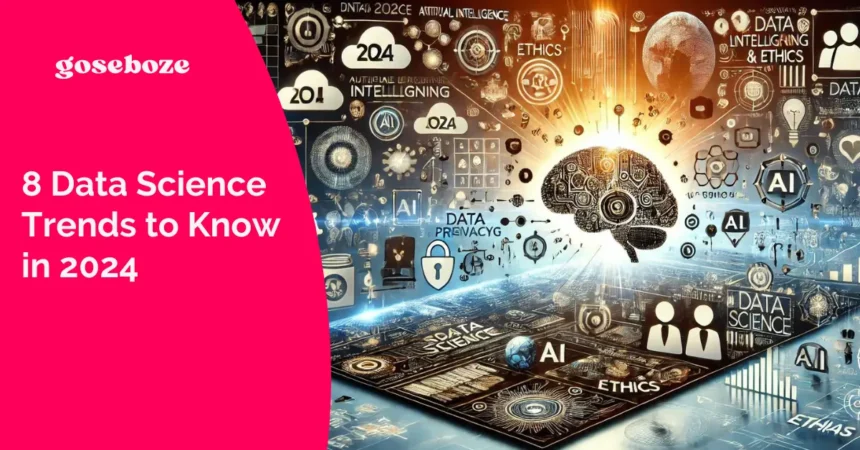The field of data science continues to evolve at a rapid pace, shaping the future of technology and business. This year promises groundbreaking advancements and transformative trends that will redefine how we collect, analyze, and utilize data. Right from the rise of artificial intelligence and machine learning to the growing importance of data privacy and ethics, staying informed about these key trends is crucial for anyone looking to harness the power of data. In this article, we’ll explore eight data science trends that are set to make a significant impact in 2024, offering insights and opportunities for professionals and organizations alike.
Data science is a rapidly evolving landscape, fueled by the exponential growth of data and advancements in technology. The increasing reliance on data-driven decision-making across various industries has amplified the demand for skilled data scientists. Pursuing a masters in data science equips individuals with the knowledge and skills for navigating this dynamic field. It offers in-depth training in areas including machine learning, big data analytics, and data visualization, ensuring that graduates stay abreast of the latest trends and technologies. This advanced education not only enhances technical expertise but also fosters a deep understanding of emerging practices, making graduates valuable assets in the competitive data science job market.
What is data science?
Data science is an multidisciplinary field that combines statistics, computer science, and domain expertise to extract meaningful insights from large and complex datasets. It involves processes, including data collection, cleaning, analysis, and visualization to uncover patterns, trends, and relationships. By utilizing techniques from machine learning, artificial intelligence, and predictive modeling, data scientists can make data-driven decisions, solve complex problems, and drive innovation across various industries. The goal of data science is to transform raw data into actionable insights, enabling organizations to improve operations, enhance customer experiences, and create new opportunities for growth and development.
Read Also: The Future of Artificial Intelligence: Opportunities and Ethical Challenges
Eight Data Science Trends to Know in 2024
1. Ongoing Growth in Generative AI Applications
Generative AI, which includes technologies like GPT-3 and DALL-E, continues to see significant advancements and adoption. These models are capable of creating text, images, and even music, leading to innovative applications across industries such as content creation, design, and customer service. The ability to generate realistic and contextually relevant content is driving businesses to explore and integrate these AI tools into their operations.
2. Surge in Deep Fake Video and Audio Content
Deep fake technology, which uses AI to create highly realistic but fake videos and audio, is becoming more sophisticated and widespread. While this technology offers creative and educational possibilities, it also poses significant ethical and security challenges. The surge in deep fake content is prompting urgent discussions around detection, regulation, and the ethical use of AI in media.
3. Rise in Python-Based Application Development
Python remains a dominant programming language in the data science community due to its simplicity and versatility. The rise in Python-based application development is driven by the language’s extensive libraries and frameworks for data analysis, machine learning, and artificial intelligence. Many data professionals are also turning to Python ETL tools to streamline data extraction, transformation, and loading processes, reflecting the ongoing need for efficient and accessible tools in developing data-driven applications.
4. Higher Demand for Comprehensive AI Solutions
Businesses are increasingly seeking end-to-end AI solutions that cover the entire pipeline from data collection and processing to model deployment and monitoring. This trend highlights the shift towards integrated AI systems that can provide seamless and scalable solutions, ensuring better performance and easier management of AI workflows.
5. Companies Expanding Their Data Analyst Teams
As the volume of data generated continues to grow, companies are expanding their data analyst teams to better interpret and leverage this data. Data analysts play a crucial role in transforming raw data into actionable insights, helping organizations make informed decisions and stay competitive in their respective markets.
6. More Data Scientists Participating in Kaggle
Kaggle, a popular platform for data science competitions, is seeing increased participation from data scientists worldwide. Engaging in Kaggle competitions allows data scientists to hone their skills, tackle real-world problems, and stay updated with the latest methodologies and tools. This trend underscores the importance of continuous learning and collaboration in the data science field.
7. Growing Focus on Consumer Data Protection
With the rising awareness of data privacy issues, there is a growing focus on protecting consumer data. Organizations are prioritizing data security measures and compliance with regulations such as GDPR and CCPA. This trend reflects the increasing importance of ethical considerations and trust in data handling practices.
8. AI Developers Addressing Adversarial Machine Learning Challenges
Adversarial machine learning, where malicious inputs are used to deceive AI models, poses a significant threat to the reliability and security of AI systems. AI developers are actively working on strategies to detect and mitigate these adversarial attacks, ensuring the robustness and trustworthiness of machine learning applications. This ongoing effort is crucial for the safe deployment of AI technologies in critical areas.
Importance of understanding data science trends
Understanding data science trends is crucial as it helps professionals and organizations stay competitive and innovative. Keeping abreast of the latest developments enables the adoption of cutting-edge technologies, improves decision-making processes, and drives efficient solutions to complex problems. Awareness of trends also ensures that skills and strategies remain relevant in a rapidly evolving field, fostering growth and resilience in the face of new challenges and opportunities.
Conclusion
The data science landscape is rapidly evolving, with significant trends shaping its future. Staying ahead requires continuous learning and adaptation to these emerging technologies and practices. Pursuing a masters degree in data science equips individuals with the critical knowledge and skills needed to navigate this dynamic field. This advanced education provides in-depth training in key areas such as machine learning, big data analytics, and AI, ensuring professionals are well-prepared to leverage the latest trends. By gaining expertise through a master’s program, individuals can position themselves at the forefront of the data science domain, driving innovation and success.








